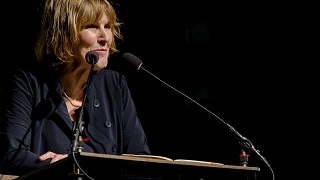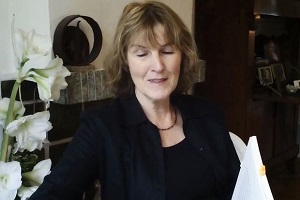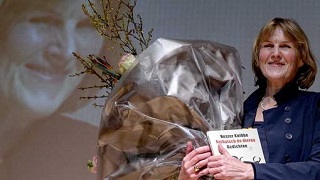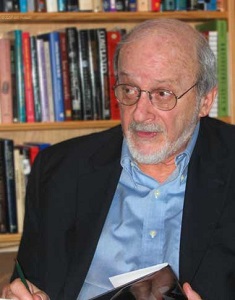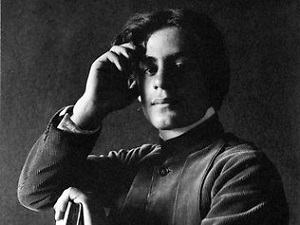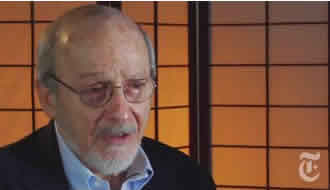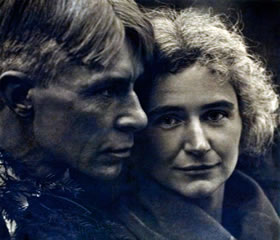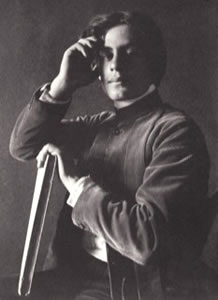De Nederlandse dichteres Hester Knibbe werd geboren op 6 januari 1946 in Harderwijk. Zie ook alle tags voor Hester Knibbe op dit blog.
Zoiets simpels
Het is vaak zoiets simpels, het is
gemis van je stem bijvoorbeeld, geen
verhaal over landschappen meer, geen
gedoe met je was, je kleren
onaangeroerd in de kast. Het is van je handen
op zoek naar houvast de afdruk nog weten
op leuning en deurpost en je voetstappen
op het parket en de trap, dat zo willen
laten, bedenken: poetsen en wrijven is
sinks de tijd verdrijven, jouw tijd
moet hier blijven. Het is
zo simpel en groot als huilen
bij meikersen, appelstroop in de schappen
en geitenkaas op het brood.
Een zuil van basalt
1.
Niet
wat men groef en weer gladstreek bedek ik
met bloemen en groen, maar het niet te dempen
gat dat je naliet. Wat ik koester is
niet de zuil van basalt en het zwarte
graniet met je naamhiëroglief, maar
hun fundament dat jij bent. Je
sprong over stenen, vulde je longen, prees
vlinder en zweefvlieg, uitbundige
bloei van de oleander. Nu
in je langste wieg neergelegd, zing je
in alle tongen van stilte: alles gezegd.
Verkeerd geparkeerde auto vernield
Je staat hier verkeerd geparkeerd
hufter, wacht even dan haal ik
m’n krik, bik ik je voorruit
eens lief uit z’n rubbers, ik
agressief? hé zoek je soms mot
ook dat kan je krijgen, kom op
als je durft, bang voor je jasje
je bankpas, je kloten misschien? en leg
dat mobieltje maar neer, als mannen
onder elkaar heb je daar niks an gewoon
met je blote handjes meneer, ja kijk uit als ik
me kwaad maak pleur ik je zo
door je vijfde deur, scheur ik je voorklep
wordt straks je mokkel niet zoenen
effetjes pech hè, zeg kom op poenige
golfyup wat zoek je, je handicap soms?
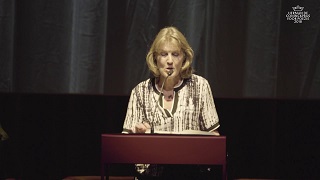
Hester Knibbe (Harderwijk, 6 januari 1946)
De Amerikaanse schrijfster Elizabeth Strout werd geboren op 6 januari 1956 in Portland, Maine. Zie ook alle tags voor Elizabeth Strout opdit blog.
Uit: The Burgess Boys
“On a breezy October afternoon in the Park Slope neighborhood of Brooklyn, New York, Helen Farber Burgess was packing for vacation. A big blue suitcase lay open on the bed, and clothes her husband had chosen the night before were folded and stacked on the lounge chair nearby. Sunlight kept springing into the room from the shifting clouds outside, making the brass knobs on the bed shine brightly and the suitcase become very blue. Helen was walking back and forth between the dressing room—with its enormous mirrors and white horsehair wallpaper, the dark woodwork around the long window—walking between that and the bedroom, which had French doors that were closed right now, but in warmer weather opened onto a deck that looked out over the garden. Helen was experiencing a kind of mental paralysis that occurred when she packed for a trip, so the abrupt ringing of the telephone brought relief. When she saw the word private, she knew it was either the wife of one of her husband’s law partners—they were a prestigious firm of famous lawyers—or else her brother-in-law, Bob, who’d had an unlisted number for years but was not, and never would be, famous at all.
“I’m glad it’s you,” she said, pulling a colorful scarf from the bureau drawer, holding it up, dropping it on the bed.
“You are?” Bob’s voice sounded surprised.
“I was afraid it would be Dorothy.” Walking to the window, Helen peered out at the garden. The plum tree was bending in the wind, and yellow leaves from the bittersweet swirled across the ground.
“Why didn’t you want it to be Dorothy?”
“She tires me right now,” said Helen.
“You’re about to go away with them for a week.”
“Ten days. I know.”
A short pause, and then Bob said, “Yeah,” his voice dropping into an understanding so quick and entire—it was his strong point, Helen thought, his odd ability to fall feetfirst into the little pocket of someone else’s world for those few seconds. It should have made him a good husband but apparently it hadn’t: Bob’s wife had left him years ago.
“We’ve gone away with them before,” Helen reminded him. “It’ll be fine. Alan’s an awfully nice fellow. Dull.”
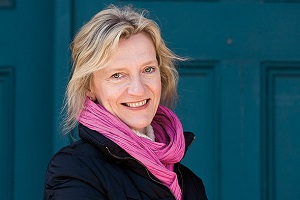
Elizabeth Strout (Portland, 6 januari 1956)
De Libanese dichter en romanschrijver Khalil Gibran werd geboren op 6 januari 1883 in Bischarri. Zie ook alle tags voor Khalil Gibran op dit blog.
Aarde (Fragment)
Wij lasteren de naam van God en jij zegent.
Wij ontheiligen en jij heiligt.
Wij slapen zonder dromen, maar jij
Droomt in je eeuwige waaktoestand.
Wij doorboren je boezem met zwaarden en speren,
En jij kleedt onze wonden met olie en balsem.
Wij beplanten je velden met schedels en beenderen,
En jij verbouwt cipressen
En wilgen.
Wij legen ons afval in je schoot, en jij vult
Onze voorraadschuren met tarweschoven
En onze wijnpers met druiven.
Wij maken van je grondstoffen bommen
En kanonnen, maar jij schept uit dezelfde stoffen
Lelies en rozen.
Hoe geduldig ben je, aarde, en hoe barmhartig!
Ben je een atoom van stof, dat opwaait
Door de voeten van God toen Hij reisde van het oosten
Naar het westen van het universum?
Of een vuurvonk uit de oven
Van de eeuwigheid?
Ben je een zaad dat in de velden is geworpen
Van het firmament om Gods boom te worden
Die uitreikt boven de hemelen met zijn hemelse takken?
Of ben je een druppel bloed in de aderen van de
Reus der reuzen, of een druppel zweet op zijn
Voorhoofd?
Ben je een vrucht die gerijpt is in de zon?
Groei je aan de boom van absolute
Kennis, waarvan de wortels zich uitstrekken door de
Eeuwigheid en waarvan de takken door het
Oneindige zweven?
Ben je een juweel geplaatst door de God van de tijd in de
Palm van de God van de ruimte?
Wie ben je, aarde, en wat ben je?
Jij bent mij, aarde!
Jij bent mijn blik en mijn onderscheidingsvermogen.
Jij bent mijn kennis en mijn droom.
Jij bent mijn honger en dorst.
Jij bent mijn vreugde en verdriet.
Jij bent mijn onachtzaamheid en mijn waakzaamheid.
Jij bent de schoonheid die in mijn ogen leeft,
Het verlangen in mijn hart,
Het eeuwige leven in mijn ziel.
Jij bent mij, aarde.
Als het niet voor mijn wezen was geweest,
Dan zou jij niet hebben bestaan.
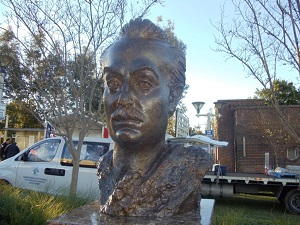
Khalil Gibran (6 januari 1883– 10 april 1931)
Monument in Sydney, Australië
De Franse schrijver Romain Sardou werd geboren op 6 januari 1974 in Boulogne-Billancourt. Zie ook alle tags voor Romain Sardou op dit blog.
Uit: America
« Toute la nuit des messagers avaient été lancés depuis l’est de l’Irlande afin de couvrir les cinquante lieues qui les séparaient de Dublin, s’arrêtant aux étapes pour se désaltérer mais sans descendre de cheval tant leur mes-sage était urgent : — Hier, près du village d’Aughrim, la dernière année des Irlandais a affronté celle des Anglais. — Elle l’a emporté ? — Non. — Perdu ? — Que me chantes-tu de perdre ? Elle a été taillée en pièces ! C’est nous qui sommes perdus… Les messagers qui parvenaient à pénétrer dans Dublin se précipitaient à l’auberge du Vina Norrois, dernier quartier général des catholiques de la capitale. L’un des témoins oculaires de la défaite arriva dans un état effroyable. Il était jeune, trempé de boue, maculé de sang. U fut rassasié et pansé avant de pouvoir prendre 13 parole. Le jeune homme arracha le haut de son plastron. Ce n’était point un soldat, comme tous l’avaient pensé, mais un diacre. Il relata la sanglante journée du I2 juillet : — Tout avait pourtant commencé pour le mieux, fit-il remarquer. Le nouveau général de notre année, le mar-quis français de Saint-Ruth, avait fixé la prochaine bataille dans un défilé de marais et de tourbières dominé par une longue crête, haute d’une soixantaine de mètres. Hier, les années anglaises commandées en chef par k général de Ginkel arrivèrent vers nous au point du jour, sans imagi-na ce qui les attendait. Un épais brouillard empêchait de se repérer à plus de vingt pas ; aveugles, trente mille sol-dats protestants s’approchaient de vingt mille soldats catholiques, sans que rien ne s’entendit nulle part. Les premiers assauts ont tourné à noue avantage : le sang des Anglais débordés s’accumula au bas de la crête jusqu’à recouvrir une nappe d’eau donnante ; nos soldats y plan-taient leurs bottes et les désembourbaient avec un affreux bruit de succion. A ce moment, la victoire semblait acquise, Ginkel était prêt à capitula mais la chance lui a souri insolemment : k ronflement de nos canons a cessé d’un coup. Ç’a été la stupeur. Les nouvelles munitions britanniques qu’on nous avait fournies ne correspondaient pas au calibre de nos pièces d’artillerie françaises ! Saint-Ruth, voyant nos artilleurs harcelés, a foncé à leur res-cousse, convaincu que ce fait d’armes serait décisif. On l’entendit s’exclamer, en plein galop : 11 Le jour est à nous !. Moins d’une minute plus tard, il avait la tète emportée par un boulet ennemi. Le rapport de force s’inversa. La salle de l’auberge du Vieux Norrois était silen-cieuse ; la trentaine de catholiques présents écoutaient le diacre, comme au supplice. — Dieu m’est témoin, reprit-il, la nuit seule a sauvé ce qui demeurait de l’infanterie du marquis de Saint-Ruth. Les Anglais ont abandonné, sans sépulture, plus de quant mille des nôtres, voués à être dévorés par les chiens errants et les corbeaux. Nos rares rescapés se sont retran-chés dans la cité de Limerick_ Mais la débâcle n’est pas discutable. Ils ne tarderont pas à déposa les armes. Par-tout, les protestants exultent. Nous sommes vaincus… Le diacre se signa .».
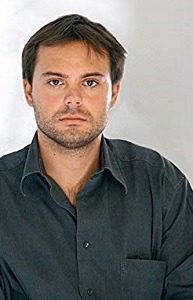
Romain Sardou (Boulogne-Billancourt, 6 januari 1974)
De Amerikaanse dichter Carl Sandburg werd geboren op 6 januari 1878 in Galesburg, Illinois. Zie ook alle tags voor Carl Sandburg op dit blog.
The Long Shadow of Lincoln: A Litany
(We can succeed only by concert. . . . The dogmas of the quiet past are inadequate to the stormy present. The occasion is piled high with difficulty, and we must rise with the occasion. As our case is new so we must think anew and act anew. We must disenthrall ourselves. . . . December 1, 1862. The President’s Message to Congress.)
Be sad, be cool, be kind,
remembering those now dreamdust
hallowed in the ruts and gullies,
solemn bones under the smooth blue sea,
faces warblown in a falling rain.
Be a brother, if so can be,
to those beyond battle fatigue
each in his own corner of earth
or forty fathoms undersea
beyond all boom of guns,
beyond any bong of a great bell,
each with a bosom and number,
each with a pack of secrets,
each with a personal dream and doorway
and over them now the long endless winds
with the low healing song of time,
the hush and sleep murmur of time.
Make your wit a guard and cover.
Sing low, sing high, sing wide.
Let your laughter come free
remembering looking toward peace:
“We must disenthrall ourselves.”
Be a brother, if so can be,
to those thrown forward
for taking hardwon lines,
for holding hardwon points
and their reward so-so,
little they care to talk about,
their pay held in a mute calm,
highspot memories going unspoken,
what they did being past words,
what they took being hardwon.
Be sad, be kind, be cool.
Weep if you must
And weep open and shameless
before these altars.
There are wounds past words.
There are cripples less broken
than many who walk whole.
There are dead youths
with wrists of silence
who keep a vast music
under their shut lips,
what they did being past words,
their dreams like their deaths
beyond any smooth and easy telling,
having given till no more to give.
There is dust alive
with dreams of The Republic,
with dreams of the Family of Man
flung wide on a shrinking globe
with old timetables,
old maps, old guide-posts
torn into shreds,
shot into tatters
burnt in a firewind,
lost in the shambles,
faded in rubble and ashes.
There is dust alive.
Out of a granite tomb,
Out of a bronze sarcophagus,
Loose from the stone and copper
Steps a whitesmoke ghost
Lifting an authoritative hand
In the name of dreams worth dying for,
In the name of men whose dust breathes
of those dreams so worth dying for,
what they did being past words,
beyond all smooth and easy telling.
Be sad, be kind, be cool,
remembering, under God, a dreamdust
hallowed in the ruts and gullies,
solemn bones under the smooth blue sea,
faces warblown in a falling rain.
Sing low, sing high, sing wide.
Make your wit a guard and cover.
Let your laughter come free
like a help and a brace of comfort.
The earth laughs, the sun laughs
over every wise harvest of man,
over man looking toward peace
by the light of the hard old teaching:
“We must disenthrall ourselves.”
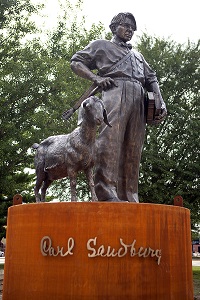
Carl Sandburg (6 januari 1878 – 22 juli 1967)
Standbeeld in Galesburg
De Duitse schrijver Jens Johler werd geboren op 6 januari 1944 in Neumünster. Zie ook alle tags voor Jens Johler op dit blog.
Uit: Kritik der mörderischen Vernunft
„Ich muss die E-Mails checken.
Mit einem Ruck richtete er sich im Bett auf. Ein stechender Schmerz fuhr durch seinen Kopf. Er hielt sich mit der linken Hand die Stirn, während er auf die Uhr schaute. Es war kurz nach halb vier.
Ich muss die E-Mails checken, dachte er wieder.
Es war vollkommen unsinnig, er konnte es genauso gut am Morgen machen, aber die Idee saß fest.
Er stand auf, zog sich den Bademantel an, ging hinüber ins Arbeitszimmer und drückte auf die Power-Taste des Computers. Dann machte er sich auf den Weg ins Bad. Als er wieder
herauskam, hielt er eine Schlaftablette und eine Doppelpackung Aspirin mit C in der Hand.
In der Küche nahm er ein Glas aus dem Regal, füllte es mit Wasser, riss die Aspirinpackung auf und ließ zwei Brausetabletten ins Glas gleiten. Während sie sich auflösten, dachte er an das Telefongespräch, das er gestern Abend geführt hatte.
Es ging eigentlich nur um die Verabredung am kommenden Samstag. Sein Freund Hans-Otto Mertens wurde fünfzig und gab ein großes Fest, auf dem ihre alte Band aus der Schülerzeit
noch einmal auftreten sollte. Sie hatten erst über die Songs geredet, die sie spielen wollten, und dann noch ein bisschen übers Älterwerden und darüber, dass Troller ja in diesem Jahr auch fünfzig wurde, und auf einmal war alles aus ihm herausgebrochen, er wusste selbst nicht war um: Dass er es leid war, dass er es satt hatte, das ganze Leben, die ewige Wiederkehr des Gleichen und vor allem die totale Wirkungslosigkeit.
Natürlich war es undankbar, so zu reden, er hatte einen Job, um den ihn neunzig Prozent seiner Kollegen beneideten, er hatte eine Freundin, um den ihn neunzig Prozent der Männer beneideten, er hatte eine Tochter, die er liebte, auch wenn er sie zu selten sah, er verdiente gut, er war sogar gesund, was wollte er mehr? Er war undankbar, aber wem gegenüber? Dem Schicksal? Warum hatte ihm das Schicksal nicht ein anderes Leben zugewürfelt? Eines, in dem er etwas bewirken konnte. Eines, in dem er sich nicht so nutzlos fühlte. Denn das war er: nutzlos. Er schrieb bedeutende Artikel, aber was bedeutete das schon? Sie verpufften. Wie alles, was für den Pressemarkt geschrieben wurde.“

Jens Johler (Neumünster, 6 januari 1944)
Cover
De Duitse dominee en dichter van (geestelijke) liederen Philipp Friedrich Hiller werd geboren op 6 januari 1699 Mühlhausen an der Enz, nu een voorstad van Mühlacker. Zie ook alle tags voor Philipp Friedrich Hiller op dit blog.
Die Gnade sei mit allen
Die Gnade sei mit allen, die Gnade unsers Herrn, des Herrn,
dem wir hier wallen, wallen und sehn sein Kommen gern.
Auf dem so schmalen Pfade gelingt uns ja kein Tritt,
es gehe seine Gnade, Gnade denn bis zum Ende mit.
Auf Gnade darf man trauen, man traut ihr ohne Reu;
und wenn uns je will grauen, grauen, so bleibt’s: der Herr ist treu.
Damit wir nicht erliegen, muß Gnade mit uns sein;
denn sie flößt zu dem Siegen, Siegen Geduld und Glauben ein.
So scheint uns nichts ein Schade, was man um Jesum misst;
der Herr hat eine Gnade, Gnade, die über alles ist.
Bald ist es überwunden nun durch des Lammes Blut,
das in den schwersten Stunden, Stunden die größten Taten tut.
Herr, laß es dir gefallen, noch immer rufen wir:
die Gnade sei mit allen, allen, die Gnade sei mit mir!
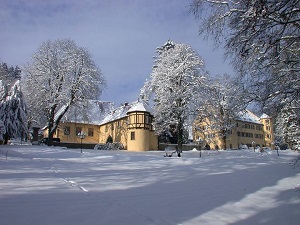
Philipp Friedrich Hiller (6 januari 1699 – 24 april 1769)
Schloss Mühlhausen in Mühlhausen an der Enz
De Amerikaanse schrijver Edgar Laurence Doctorow werd geboren op 6 januari 1931 in New York. Zie ook alle tags voor E. L. Doctorow op dit blog.
Uit: City Of God
“This afternoon in Battery Park. Warm day, people out. Soft autumn breeze like a woman blowing in my ear.
Rock doves everywhere aswoop, the grit of the city in their wings.
Behind me the financial skyline of lower Manhattan sunlit into an island cathedral, a religioplex.
And I come upon this peddler of watches, fellow with dreadlocks, a big smile. Standing tall in his purple chorister’s robe. His sacral presence not diminished by the new white Nikes on his feet.
“Don’t need windin, take em in de showerbat, everyting proof, got diamuns ’n such, right time all de time.”
A boat appears, phantomlike, from the glare of the oil-slicked bay: the Ellis Island ferry. I will always watch boats. She swings around, her three decks jammed to the rails. Sideswipes bulkhead for contemptuous New York landing. Oof. Pilings groan, crack like gunfire.
Man on the promenade thinks it’s him they’re after, breaks into a run.
Tourists down the gangplank thundering. Cameras, camcorders, and stupefied children slung from their shoulders.
Lord, there is something so exhausted about the NY waterfront, as if the smell of the sea were oil, as if boats were buses, as if all heaven were a garage hung with girlie calendars, the months to come already leafed and fingered in black grease.
But I went back to the peddler in the choir robe and said I liked the look. Told him I’d give him a dollar if he’d let me see the label. The smile dissolves. “You crazy, mon?”
Lifts his tray of watches out of reach: “Get away, you got no business wit me.” Looking left and right as he says it.
I was in mufti-jeans, leather jacket over plaid shirt over T-shirt. Absent cruciform ID.
And then later on my walk, at Astor Place, where they put out their goods on the sidewalk: three of the purple choir robes neatly folded and stacked on a plastic shower curtain. I picked one and turned back the neck and there was the label, Churchpew Crafts, and the laundry mark from Mr. Chung.
The peddler, a solemn young mestizo with that bowl of black hair they have, wanted ten dollars each. I thought that was reasonable.
They come over from Senegal, or up from the Caribbean, or from Lima, San Salvador, Oaxaca, they find a piece of sidewalk and go to work. The world’s poor lapping our shores, like the rising of the global warmed sea.”
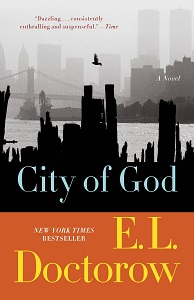
E. L. Doctorow (6 januari 1931 – 21 juli 2015)
Cover
Zie voor nog meer schrijvers van de 6e januari ook mijn vorige blog van vandaag

